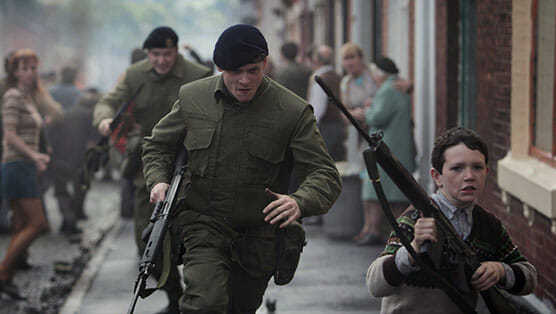’71

’71 is a claustrophobic experience, as gray and imposing as the film’s muted color palette. Set largely in Belfast during the midst of one of the most violent periods of the Northern Ireland Conflict, the feature directorial debut of Yann Demange doesn’t floor us with fresh insights about war or man’s inhumanity to man. No, ’71 is far too intimately focused on its besieged protagonist for anything so sweeping. How can one worry about poetry when not getting killed is the higher priority?
The film stars Jack O’Connell, best known to American audiences as the lead in Unbroken, although he was better, simpler, in the little-seen Starred Up, a marvelous British drama in which he played a ferociously volatile prisoner coping with the presence of his long-lost convict father (Ben Mendelsohn). In all three films, O’Connell projects a rugged, effortless authenticity—he is all live-wire intensity, even while he mostly stands there, doing nothing.
In ’71, O’Connell is British soldier Gary Hook, although the character is left so intentionally unspecific that it’s almost as if he has no name. We know Gary has a young brother, to whom he says goodbye early in the film, assuring the boy he’ll be safe. That turns out to be inaccurate: He and his fellow soldiers are shipped to Belfast to serve as security for an area heavily divided between Catholic nationalists and Protestant unionists. Almost immediately, Gary’s troop faces angry protests from Catholics in the region—kids hurl vulgarities, the adults throw rocks—and quickly, maddeningly, shots are fired. Trying to retrieve a British machine gun pilfered by a local kid, Gary soon discovers he’s cut off from his squadron, every city street now a potential death zone.
-

-

-

-

-

-

-

-

-

-

-

-

-

-

-

-

-

-

-

-

-

-

-

-

-

-

-

-

-

-

-

-

-

-

-

-

-

-

-

-








































